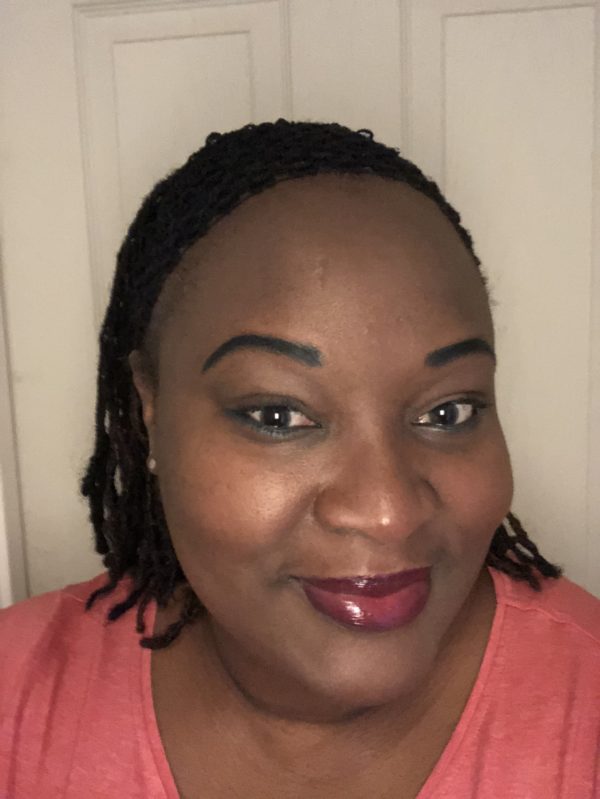
In this edition of #PoetryTalk, Uchechukwu Peter Umezurike chats with Adura Ojo about her writing. In the interview, she talks about various aspects of her work, including how it explores the fragility of love, desire, pleasure, womanhood and humanity.
Ojo is the author of Life is a Woman Breaking Eggs. A British-Nigerian poet and writer, Ojo’s poems have been published online and in print: Acumen, African Writer, Dryland, Mounting the Moon: Queer Nigerian Poems, Panorama: The Journal of Intelligent Travel, Praxis, Sentinel Literary Quarterly, The New York Times, The Poetic Pinup Revue, and The Wait Anthology. Her poem, ‘Four Corners’ was highly commended in the Sentinel Literary Quarterly Poetry Competition, July 2011. Another poem, ‘When He Comes’ was featured in a poetry competition in the New York Times in January 2017. A Pushcart prize nominee for her poem ‘Witch,’ Ojo delights in letting her poems ‘misbehave.’ She likes to think that poems have their own minds.
Umezurike
I am just curious, but how did you decide on the title of your collection and why?
Ojo
Everything is a creation; what we see, what we know and do. Everything is related to everything else. So it’s about finding one’s space and meaning within that. When I started writing the poems in the collection, I had no idea of what I wanted to call it. I just knew that there was something to be said and that I had to say it. Characters, experiences here and there chose me to say what they had to say. They all started from an egg and asked me to take it from there. I had questions. Does it break? What happens before it breaks? What happens when it breaks? What is that journey like?
Umezurike
Life is a Woman Breaking Eggs is a large volume. Could you go through your experience of writing it? How long did it take you to put it together?
Ojo
The first edition took about three years. Initially I just wrote poems and enjoyed the creative process. Some were published in journals. I was not thinking about making a collection. It was also a time of turmoil in my life. Creating was a useful distraction, an outlet. I started to think of a collection in 2013 but I wrote a good number of poems in the collection (first edition) before that year. The first edition of LIAW was published in August 2014. In 2017, I decided to publish a second edition, this time with added new material of 40 more poems. These poems were integrated into sections of the previous collection plus a fourth section. Both editions were self-published. I’m pleased with both editions but as a writer, I’d rather focus on writing.
Umezurike
You mentioned elsewhere that you started writing at 16. Can you remember what you wrote about when you first started writing? Tell us how you found poetry.
Ojo
I came into serious writing much later in my adult life. Writing was not considered a viable career choice when I was younger. Could you imagine telling a Nigerian parent 30 years ago that you wanted to be a writer? Ha! Assuming one would live to tell the tale! I have lived two lifetimes in other careers. After my English degree in UI, I got a law degree, got bored, then got a Masters and practiced in the field of social work for many years. I came into serious writing quite late – 1n 2005 I briefly worked as a columnist for the Nigerian Independent on Sunday (Newspaper). Then in 2010, I started to consider writing seriously. It was not an easy decision. But I’m here! Poetry, for me, is synonymous with love. That is how I found poetry – by writing to my first love. It was love and poetry is love. I was 16, a first year English Studies student at the University of Ibadan in Nigeria. I found love in the poetry of John Keats and William Wordsworth. We did not study any female poets. They were all men. So I had to do some reverse role play, like role swapping. It was 1984! My first love loved my poem, he kept it for 20 years.
Umezurike
There’s a lively lilt to your poetry. “A Girl’s Pledge,” Perfect Ex,” “Connie,” and “Ikogosi,” to reference a few, evince this quality. I particularly like “Owú Rubutu”:
ó yá ijó yá, òwú rubutu
dance the dance of spirits old
ki bàtà mólẹ̀ ká jó
ijó bàtá
hips so swell, beads to the beat
Do you write the poems with the aim to perform them? Have you done any spoken word poetry?
Ojo
’ve been asked this question before and I understand why. I suppose there is something visual and moving in the rhythm. Images and sounds come to me when I write. I represent that on paper the best way I can. I certainly would welcome a performer to bring to life some of my poems on stage. I think of having the entire collection dramatized in some way as it appears to lend itself to that. I can actually see it. Maybe one day it will be picked up. We’ll see.
Umezurike
You seem to favor a sort of aphoristic and colloquial style of writing. Why do you choose to write in this form? Could you elaborate a little on its significance? I am interested to hear how a poem can ‘misbehave’.
Ojo
The aphoristic leaning that you refer to could be attributed to my cultural grounding within a Yoruba philosophical approach to universality in thought and language from an early age. I love Yoruba proverbs, adages; the wisdom and beauty one finds within them. I find that the deeper I go for layers of meaning, the more the Yoruba in me strives for avenues I can employ creatively for the English medium. And perhaps this is also why I feel more comfortable writing outside the margins because it allows me to use these twin voices of English and Yoruba.
The writing of poetry invariably leads from the reading of it. My favorite poets are those I can relate to. They are accessible, use simple language, but have complex layers in the conceptualization and creation of their work: Poets like Claudia Rankine, EE Cummings, Lucille Clifton, Warsan Shire, Ocean Vuong — to name a few. So it was always part of my vision to write in a way that was accessible to more than a few, including non-lovers of poetry. I also think poetry and in fact, literature in general suffers from polarization. The art of literature suffers from what can be described as the two hallows — Of fine tastes and the well-heeled on the one hand; and the ravages of war, famine and poverty on the other. There are other voices to be heard, everyday voices speaking in the language we hear on the streets — people just having a bad day or going about their day and hoping for the best out of it. ‘Connie’ is one such voice. The day that she spoke to me, I wrote down exactly what she said. Poetry does not come to me in ready-made verses. It comes to me in the form of characters with vastly different voices and demands. It can be schizophrenic, the experience of putting one’s creative musings onto paper. The promise I make to my characters is to be as authentic to their voices as I could possibly be. A poem misbehaves when one is writing outside the margins. By that I mean when as a poet, one would switch voices within the same poem/verse, introduce images abruptly albeit dramatically, not observing metric patterns, not writing in line with any trends, fads or existing traditions. I write outside the margins all the time. I write like there are two people in the room: one person is speaking and the other is listening. Sometimes the talker guesses the thoughts of the listener and those thoughts find a way into the poem. These are usually the only parameters I employ when writing a poem. I am not bound by rules or conventions. Everything is open to interpretation. If EE Cummings wrote within the margins and conventions of his time, no one would know of him now.
Umezurike
The imagery in “Orange Rage” is fascinating. These lines struck me:
the might of his phallus will stir us
like his joystick of hate will grab us
What inspires them? Could you say a bit about the poem?
Ojo
(Laughs.) I tend to prefer not deconstructing my own poems. I will say the poem has a particular shape in the form of two letters, if you look at it closely. Those two letters as well as the title of the poem will tell you more than I can say here. I wrote it in reaction to some controversy a few years ago. Since then there’s been a lot more controversy with other famous people in the fray and a whole movement developed globally. These issues are still ongoing, as you can imagine. So those lines have as much relevance today as when I first wrote them.
Umezurike
“Skin,” “French,” “Zebra Crossing,” “Xerox” and “Moroccan Blues” address themes of culture and citizenship. How has poetry helped you to understand questions of identity in your work, say, as a British-Nigerian? What work can poetry do to clarify the fears behind belonging and difference?
Ojo
As far as my own identity is concerned, I sometimes laugh at myself. Reading my own work, I feel I come across as two poets. That’s not to say that I’m special or that I’m doing twice the work of other poets or that I’m extra in any way. I try to imagine myself as someone else reading my work. I ask myself what I make of it. How is it that “Owu Rubutu” and “Perfect Snow” are written by the same person? I read two voices, I hear two voices performing. (Laughs) But then, it is not surprising. I’m Nigerian, I’m also British. I lived in Nigeria for 18 years (all of my formative years from age 3 – 21) and go back as often as I can. So yes, cultural identity, and its relationship to spirituality, is something I see as essential to human consciousness and survival. Straddling two cultures can be of creative benefit to the poet, if it is harnessed properly.
Poetry is great at clarifying belonging and difference in the sense that an encounter with poetry is one that requires an open mind. Great poetry is open to interpretation; you can come in one way and leave via another route. Maximising the benefits of poetry – be it intellectually or spiritually – requires the expulsion of biases before you get through the door. Unfortunately the reality for many is that we live in a world where the colour of our skin to a large extent determines how people choose to judge us – whatever they have chosen to associate with the colour. I am a citizen of the world wherever I go, though I’d admit I feel slightly out of sync when it is not an English-speaking country. But generally I’m at home wherever I’m treated like a human being, that’s always good enough for me.
Umezurike
“Girlfriend” and “Bollocks” touch on intimate partner violence. The images are familiar, and the poem recounts how abused persons sometimes, in “muffling [their] pain on soft towels,” excuse the violence they suffer at the hands of their partners. What is the inspiration behind both poems?
Ojo
I’m a witness to the experiences of women affected by coercive manipulation and domestic violence: experiences of neighbours, acquaintances and their families, clients and their families. I’m inspired by characters that speak to me in the ‘real’ world, creative worlds and the worlds in between. In LIAW, there is definitely a layering and mix-layering of experiences from all of those worlds. So there is a real world, a creative world and also a world of dreams which makes its way between these two other worlds. It’s also a way of coping with the horrors of what one is putting on the page.
Umezurike
“In Ripening,” you contemplate issues of maternity. Has motherhood impacted your writing in any significant way? What aspects of it has worked its way into your writing?
Ojo
Motherhood can be a life affirming experience and it can also be traumatic. It is not surprising that the two experiences co-exist – making it a rounded experience that can impact on creativity. There are a few poems in LIAW about the idea and symbolism of the birthing journey of which ‘Ripening’ is one. Both characteristics– life affirming and trauma – are just as important. Motherhood is a journey and a challenge. A woman may find that a necessary aspect of the journey is losing herself; then learning to find herself again, and at the same time, raising children to be their own persons in the world. Not enough is said about the traumatic feature of mothering and the changes it brings into a woman’s life, its impact on identity and self. This is perhaps truer of non-western societies. Western societies are more honest about motherhood; the navigation of the pros and cons, so to speak. In Nigeria, young women are told all ‘the good things’ about motherhood. It’s a societal conspiracy not to tell young women what patriarchy will require of them and how much they could potentially lose in themselves. It is serious social harm, an injustice, to place marriage and motherhood at the centre of a woman’s life as compulsory rights-of -passage she must undertake in order to be whole. A sane society invested in the welfare of women would allow them the personal freedom to consider that motherhood is a choice, not a necessity.
Umezurike
As a female poet one cannot avoid discussing feminist concerns, and a poem such as “Dough” hints at sexual objectification of women. Can you speak more about “a Woman Knows her Place”? Would you like to talk about the place of feminism in your work?
Ojo
The female body has been the world’s obsession since the beginning of humanity. As a female poet and writer, I am both victim and survivor of that obsession. This is something that finds its way into one’s consciousness and the creation of that consciousness. Sadly, there is little or nothing to convince us that this will change anytime soon. This is why a woman would break eggs to make sense of the world, to remain free and hopeful. Exorcising the world’s obsession with the female body is one of the difficult isms to tackle, along with racism, homophobia and religious intolerance. Feminism is important. It is as important as humanity is important. Feminism is a necessary part of performing humanity. There is no getting away from it in a decent society. A woman knows her place but sadly in some cultures, she may not have the right to get up there. A culture is better equipped for giving her the means to profit a generation.
Umezurike
Who are the poets you look up to? How have they contributed to your development as a poet?
Ojo
I admire poets who write outside the margins of what is considered traditional or conventional, poets who see the poem as a flexible instrument to be harnessed for what suits at the point of creating. I love Alice Notley, Warsan Shire, Leila Chatty, Claudia Rankine, EE Cummings, Audre Lorde, Uche Nduka, David Ishaya Osu, Anne Carson. These poets are not boxed in by conventions. There is no limit to their art. I admire their views of the world. I see them in rooms of their own, loving – misbehaving and singing. Owning one’s room in a crowded house is a lot of work. These poets taught me the value of that.
Umezurike
How far have you gone with completing your second collection? Would you like to share a bit of its themes? Finally, how soon should we expect to see it in print?
Ojo
I’m working on the concept. Perhaps a collection will be ready in a year or two. At the moment I’m looking at hybrid forms, and working with the idea of the poem being flexible in format as it can be. I’m inspired by Claudia Rankine’s Citizen. My next collection would likely challenge some conventions, and in so doing, ‘misbehave.’ I’m learning to be free in my consciousness in a way that informs the creating process so that there is an organic interflow.
***************
About the Interviewer:
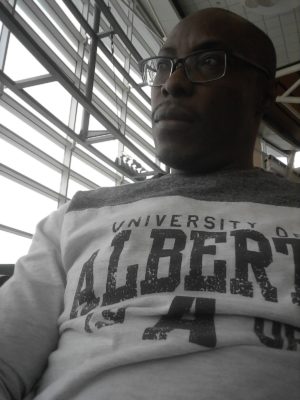 Uchechukwu Peter Umezurike is a PhD student at the department of English and Film Studies, University of Alberta. His research interests include postcolonial literatures, print culture, gender and sexuality studies. An Alumnus of the International Writing Program (USA), his work has appeared in several print anthologies such as On Broken Wings, Dream Chasers, Migrations, African Roar 2011, Daughters of Eve and Other Stories, Work in Progress & Other Stories, A Generation Defining Itself (Vol. 8),Weaverbird Collection, New Nigerian Writing, Water Testament, Calvacade, Author Africa, and Camouflage, etc.
Uchechukwu Peter Umezurike is a PhD student at the department of English and Film Studies, University of Alberta. His research interests include postcolonial literatures, print culture, gender and sexuality studies. An Alumnus of the International Writing Program (USA), his work has appeared in several print anthologies such as On Broken Wings, Dream Chasers, Migrations, African Roar 2011, Daughters of Eve and Other Stories, Work in Progress & Other Stories, A Generation Defining Itself (Vol. 8),Weaverbird Collection, New Nigerian Writing, Water Testament, Calvacade, Author Africa, and Camouflage, etc.


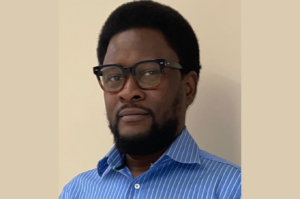


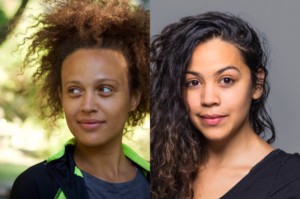
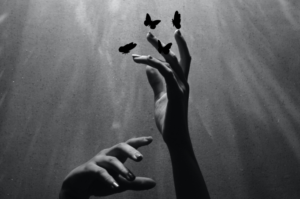


COMMENTS -
Reader Interactions